Tag: Sabrina Guilbeault ’18
Rising Juniors Raise Housing Concerns
by The Cowl Editor on April 6, 2017
News
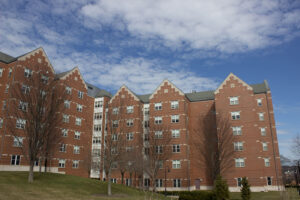
by Sabrina Guilbeault ’18
Assistant News Editor
A crisis can be described as a time of intense difficulty, and although using the word in relation to on-campus housing can be inflammatory, the phrase “housing crisis” has been thrown around by students these past few weeks as groups of juniors have yet to be officially placed in their residence halls for the next school year.
Due to a variety of factors such as a greater amount of students studying abroad in the fall, the decision to not uproot sophomores from apartments or suites halfway through the year, and the decision that the Class of 2019 will not be permitted to live off campus as juniors, placing rising juniors with the housing decisions of their choice has been difficult and has resulted in what students have deemed a crisis.
Residence Life has been hard at work to resolve the issue. “Residence Life has been working to make housing selection more and more student friendly,” said Nicole Giglia, associate director of residence life, who has been working closely with students to configure a housing option that works. “Since there are a few more layers to our process than other institutions, it can seem complicated, but it’s really to offer the students the best opportunity to live with students that are a good match.”
Giglia attended the Student Congress meeting on Tuesday, March 28, and fielded questions as students voiced their concerns. When asked about the whispers that stated juniors will be forced in traditional residence halls such as Meagher, Guzman, and Aquinas, she was quick to dispel the rumor. “Juniors will only live in traditional housing if they choose to,” she said. “All juniors who wish to be in the apartments or suites will be.”
Steven Sears, dean of students, also fielded concerns at the meeting, and encouraged the Congress to make legislation if they are truly passionate about the issue. In hopes to make the task of placing juniors in their housing assignments less difficult in the future, Caroline Cook ’19, president of the Class of 2019, presented two pieces of legislation at this past Tuesday’s meeting.
One was a statement of position, stating that juniors should be allowed to live off campus. The other recommended that Residence Life place all students in their housing based off seniority, so that the sophomore class would not be placed with their housing assignments until the junior class was officially placed. This year, members of the rising sophomore class know where and who they are living with before some members of the junior class.
“All students who need housing will be placed,” said Giglia. “However, some students will receive their official room information after our housing selection process has been wrapped up.”
Giglia also explained that juniors were not denied housing in the suites and apartments, but that Residence Life must give groups of full year sophomores housing in the suites/apartment areas based on what is designated for the sophomore class. In other words, full year sophomore groups have been placed before junior groups who may have to be split up due to study abroad.
“Though I’m not going abroad, I was still affected by this issue, as people in my group are going abroad,” said Cook. “I received an email about two weeks ago, basically stating that my group was going to be split up, and I had very limited options.” She explained that although her situation has been resolved it, is not her ideal situation. She is troubled that there are still students going abroad in the fall who will not find out where they are living until potentially the end of the summer.
In an ideal world, an even amount of students will be studying abroad in the fall and spring, and would make housing placement much easier.
“Students who are studying abroad ideally work with their fellow students to identify someone to ‘swap’ housing within the alternating semester,” said Giglia. She explained that Residence Life works with groups to identify groups to switch with so that they can maximize their housing options for all class years. “Sometimes that means students won’t get their housing placement right away but it’s to ensure that we can provide study abroad students with housing in the apartments or suites and with their group members when possible.”
Uprooting sophomores in the middle of the year due to students returning from abroad is something the College is avoiding this year. Alex Teri ’19 and her roommates were one of the groups who had to move from suites this year. “We got the email late in the semester saying we had to move out which obviously made us extremely angry because it was just kind of sprung on us,” she said. “We didn’t have time to plan for anything, which made it really difficult to gauge when we would move and how we would do it, and if we were told there was a good chance we would have to move, that definitely would have affected our housing decision.”
She explained had to move out of Suites before her last final in the fall, but had no where to put her belongings, and she was not given a room until she came back for spring semester. “I actually moved all of my stuff along with all of my roommates stuff into her new single in Fennell and had to sleep on the floor.” she said. Next year, all sophomores who have been placed in apartments or suites will not be uprooted.
As for the policy stating that juniors must live on campus—instead of living in the off-campus housing that surrounds PC—many students believe this is the root of the problem. According to Giglia, there is a sufficient number of beds on campus to house freshman, sophomore, and junior students. Also, at the March 28 Congress meeting, Dean Sears explained that the school loses a sufficient amount of revenue when students live off-campus, and currently the College is at a $1.9 million deficient.
“Juniors should have the option to live off campus if they so choose,” said John Stablein ’19, a member of the Student Life Committee on Student Congress. “Juniors being able to live off campus would significantly help some of the groups that do not even have housing for next year yet.” He went onto explain that he felt the rule that restricts juniors from living off campus was sprung upon his class year, as when touring the campus they were told they could live off campus as juniors. “Administration should have strategically planned to not let juniors live off campus,” he said. “It was unacceptable to be told during our freshmen year.”
Aidan Sullivan ’17, who lived off campus as a junior last year and is currently living off campus said, “I think it’s unfair to abruptly stop the opportunity to live off campus.” He explained that he chose to live off campus last year because of his decision to study abroad, as he would have had to find someone who was studying abroad in the spring to “swap” with. “Living in a house gave me the ability to easily transition back from abroad, as well as allow me to only have to pay rent once I got back,” he said.
“I think the easiest way to resolve this housing crisis now is to give juniors the choice to live off campus,” said Cook. “There are still landlords with houses that can be filled, and to give students the chance to live with their friends as well as giving them the amenities of apartments is only fair.” Cook believes that going forward, there is a need for more communication between the study abroad office and Residence Life, to make sure that there are enough beds for all of the students, both semesters.
“It is important for Student Congress to make a statement of position stating that juniors should have the option to live off campus because it is important to open up conversation with administration,” said Stablein.
He stated that juniors should have the option to live off campus due to its lower cost, and that it will help solve the problem with students not being able to live with their friends on campus due to overcrowding and splitting up to accommodate study abroad. “College is all about the people you meet,” he said. “Not being able to live with your friends at your home at college is a major problem that administration needs to realize.”
Both Stablein and Cook gave kudos to Residence Life for their work in trying to accommodate students and assist in their living situations, but find that the problem lies in the policy that prevents students from living off campus. “Residence Life and the deans have done a great job of trying to accommodate all of the students who haven’t been told of their housing status,” said Cook. “As for the students who won’t know their housing until the end of the summer, administrators should make themselves available for them as well, as it seems to students that the administration doesn’t care about the issues at hand.”
“Our housing selection process is designed to be student focused,” said Giglia, who stressed to Congress that Residence Life does want to provide students with the best available option. She explained that most colleges and universities do not allow any study abroad students to select housing and leave little to no time at all for students to regroup after their first housing option is no longer available. “We hope that through our housing selection steps, students can take the time that they need to arrange groups in a manner that allows them to live with the best possible match.”
PC Explores Off-Campus Security Options
by The Cowl Editor on March 23, 2017
News
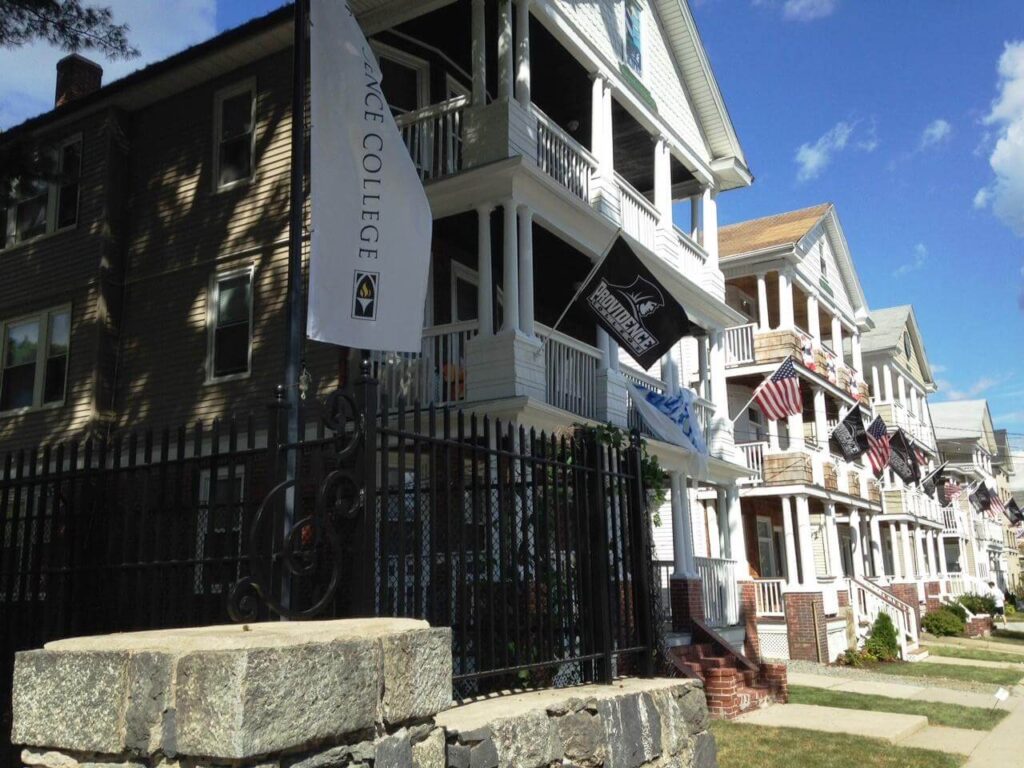
by Sabrina Guilbeault ’18
Asst. News Editor
“More and more police officers is not the solution,” said Major Jack Leyden, executive director of the Office of Safety and Security at Providence College. “We need to come up with a unified way to address safety off -campus.”
Since the start of this spring semester, the College has discussed and looked into the prospect of hiring additional security from an outside company to work as a “taskforce” on and around Eaton Street on Thursday, Friday, and Saturday nights. The proposed idea would provide additional security off campus, and would provide an additional liaison to the Providence Police Department and to the College.
On Friday, February 24, Stanley Vieira director of citizenship and off-Campus life, held a focus group meeting to receive feedback from students regarding the taskforce. “The additional security would not be put in place to get students in trouble, but would serve as additional security for safety measures,” he explained.
Students voiced their concerns and asked questions about how the relationship between students, the task force, and the Office of Safety and Security would work, and it was suggested that students living off campus attend an orientation regarding safety in the fall. Vieira stressed that the point of the security detail would not be to break up off-campus parties, but would be utilized to make off-campus living as safe for students as possible.
“I think it is extremely important, if not completely necessary for the school to ask students for their feedback on this,” said Morgan Itz ’18, chair of the student life committee on Student Congress. She explained that students who live off-campus or who often frequent off-campus are more aware of “off campus” life, and their feedback would be very beneficial.
The security company being considered for hire is Allied Universal, the largest provider of security services in North America. Boston College currently uses the company for additional security off-campus, and the City of Providence hired Allied Universal last summer for Kennedy Plaza downtown.
Negotiations are still taking place, but the College did hire the group for the Black and White Ball this past semester. According to Major Leyden, whenever there is a major event, extra security is hired to supplement PC’s. In the past, for large events such as the spring concert, the College has hired from another service called Strategic Security Group.
Major Leyden explained that the security detail will act as witnesses to assist police, students, and security. “They would be extra eyes and ears, and would contact both us and the police during an incident,” he said. Leyden also emphasized their role as communicators and that he hopes students will see them as a beacon of safety.
Itz, as a student living off campus next year, explained that she is in full support of hiring additional security. “As being one of the few houses down from the Eaton street gate, and someone who can see the security guard from the backyard, I do feel more safe than some of the other students living further down on Pinehurst and Pembroke,” she said. “It seems the further you go on these side streets, the nicer it would be to have security watching.”
Regardless of the student support, other students at the focus group meeting explained that communication with students about hiring extra security is of the utmost of importance. Students explained that if an off-campus orientation was to take place, the new security team’s role off campus needs to be properly explained.
Leyden explained that the introduction of a task force will start as a pilot program, since security wants to be as open minded to new solutions as possible, and they are willing to try different methods to achieve what is best for the off-campus community. “We’re looking for lasting solutions to increase the safety of our neighborhoods,” said Major Leyden. “The answer is not just more police, but something dynamic that involves the police and the College.”
Providence College Student Congress Updates
by The Cowl Editor on March 23, 2017
News
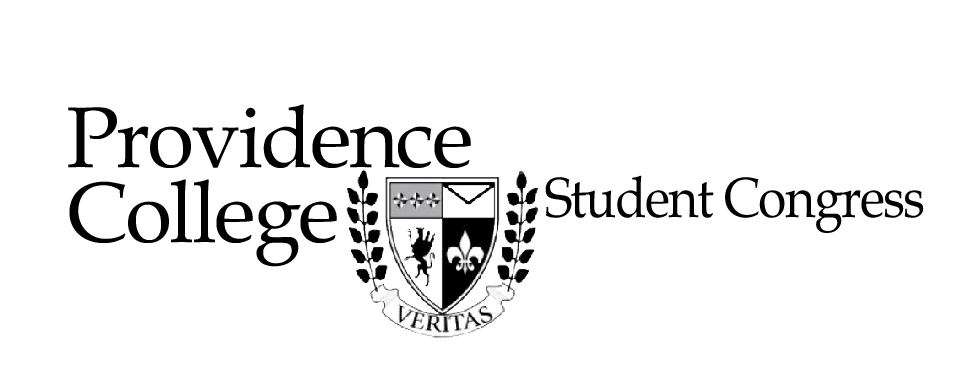
by Sabrina Guilbeault ’18
Asst. News Editors
Security
After the shooting that occurred off-campus on early Sunday morning, Director of the Office of Safety and Security Jack Leyden, Lieutenant John Dunbar, Director of Emergency Management Koren Kanadanian, and Director of Citizenship and Off-Campus Life Stanley Vieira met with the Congress for a panel discussion regarding and improving the emergency response system (FriarAlerts) used for emergency notifications. The panel explained the process of sending out Friar Alerts and the timeline that occured the night of the shooting.
They encouraged feedback from students, fielded concerns, and took note of suggestions offered by Congress.
Students on Congress asked what kind of resources were being offered to the students who were at the house during the incident. Dean of Students Steven Sears explained that the Providence College students who live in the house were offered on-campus housing and made counseling resources available to them.
Sears encouraged students who were involved or know of students involved in the incident to come forward so that appropriate resources can also be made available to them.
Campus Ministry
Father Peter Martyr, O.P., also attended the meeting, and told the Congress what Campus Ministry has done since his last meeting, and how they went about taking some of the suggestions Congress had.
Fr. Martyr explained that he is very excited about the collaboration Campus Ministry has participated in with other clubs on campus this semester, and spoke about the success of the new Peer Ministry program.
Furthermore, he told Congress that five new Dominicans will be coming to campus next year, and welcomes students to reach out if they wish to get more involved with Campus Ministry.
Old & New Business
As for old business, the bill to approve the Sustainable Development Club as a new club on Congress was passed.
Announcements
Elections for next year’s executive board for Student Congress and the Board of Multicultural Student Affairs will begin on Tuesday, March 28 on 9:30 a.m. on Sakai and will last until Wednesday, March 29 at 4:30 p.m. Interested in getting to know who is running? Meet the Candidates Night will occur this Sunday in McPhail’s from 6:00 p.m. to 7:30 p.m. Candidates will deliver their platforms and pizza will be served.
Inside Out Week Promotes Self-Love
by The Cowl Editor on March 3, 2017
News

by Sabrina Guilbeault ’18
Assistant News Editor
Taking a fitness class during Inside Out Week at Providence College is all about self-empowerment. Colorful quotes such as “I am strong. I am beautiful. I am enough” are written across the mirrors in the fitness studio, so that from every angle the theme of the week can be echoed during the class.
The way college students view their bodies and inner selves is of the utmost of importance, and through the Department of Recreational Sports, Inside Out Week provides students with the platform to love themselves for who they are.
Inside Out Week was first introduced to the College last year after Courtney Mackey, the fitness and programming assistant director, joined the PC community after coming from the University of Rhode Island. “We want students to learn to embody love for themselves,” she said.
“This week is so extremely important to me because it serves as a reminder to stop and check in with myself and be kind to my body,” said Gabi DeParis ’18, who has been volunteering throughout the week. “This week is a way to get a conversation started and let people know that they aren’t alone and that they aren’t the only ones feeling the way they do.”
Mackey explained that the organizers of the event used feedback from students last year to make this week successful, which resulted in lots of energy going into the info booths in front of Concannon Gym. The booths are displayed every day during the week, with one table dedicated to the theme of the day. Monday for example, was all about “The Body Project,” which explains that today “the body has become women’s primary object, creating a degree of self-consciousness and dissatisfaction that is pervasive and dangerous.”
Starting this past Monday, Inside Out Week aligns itself with National Eating Disorders Awareness Week, a week dedicated to talking about health concerns while celebrating recoveries, busting myths, and destigmatizing the issue. As for the official event at PC dedicated to talking about eating disorders, Sarah McCutcheon, a Project HEAL Rhode Island co-leader, was invited to speak Thursday night and shared her story of her struggle with anorexia and her journey to recovery.
McCutcheon was open and honest as she shared her story, and explained that in our society, there are a lot of prejudices against bigger bodies, and this is a stigma we need to fight. “Eating disorders are not things that go away on their own,” she said, while emphasizing the importance of getting a medical professional involved right away and of finding the right therapist.
She explained that the road to discovery is not easy, although she wishes it could be, and how it took a long time for the voices in her head saying “not to eat” and to “exercise more” to turn off. “Recovery feels like freedom,” McCutcheon said. “Body image is one of the hardest things to work on, but it is so important to feel grateful for your body.”
Other events that were held this week include an “Embody Love Workshop,” a class taught by Motherland Dance Group, and extra fitness classes that were added to the already standing fitness schedule. If students attend at least five events throughout the week, they will have the chance to win either a T-shirt or tote bag at the end of the week.
Brittany Price ’18, a fitness instructor, taught a special class just for Inside Out Week called “You Do You Groove.” At the beginning of her class, Price asked students to write and reflect on attributes they like about themselves on sticky notes, and then placed them around the mirrors. “My favorite part of teaching this week is seeing people’s refreshed, genuine interest in working out for the right reasons—not just to ‘get skinny’ or ‘get jacked,’ but to feel good,” she said.
Mackey explained that this week, students will learn from the “outside” before going inwards. “You have to be aware what’s causing you to objectify yourself,” she said. “Each day we will unveil our self-map and work our way inwards.” The “self-map” includes the physical body, the energy body, the wisdom body, and the bliss body. Each of these leads us to our deepest selves or souls that is the innermost of who we are.
Just as another quote found on the studio mirror says, “Whatever is good for the soul, do that,” and this week is all about doing what is good for the soul. Thursday was all about themes of self-love through diversity and unity, reflecting that although we may feel different, our inner souls bond us as one. Friday’s theme, “Living from the Inside Out” is more holistic and plans to tie the themes of the week together.
“The week is also about activism,” said Mackey, who explained we should all be aware of how we’re talking to one another. “When you feel love so deeply for yourself, you radiate it, and it helps others to be much more open and receptive to feeling this embodiment of love as well.”
“Loving your body is the best resolution and we are only given one body so we should do our best to treat it right,” said DeParis. “Instead of using your energy to come up with reasons to dislike your body, use it to come up with even more reasons to love and appreciate all it does for you.”
Congress Updates
by The Cowl Editor on March 3, 2017
News

by Tim Sullivan ’17
News Staff
Speaker
On Tuesday, Rafael Zapata, Providence College’s chief diversity officer, spoke to the Congress about Moore Hall’s design for the new Center for Inclusive Excellence. Zapata came to the meeting to hear students’ suggestions about programming and other intentions for the space. He had envisioned a center that included everything from learning and lounging to arts and culture.
The space’s design plan should be finalized by March 17, with the Center being fully operational by fall 2017. Students suggested more performing and visual arts capabilities, as well as a free posting space being placed in the building as well. The Center for Inclusive Excellence will cost roughly $1 million over the next two years and will be primarily funded through fundraising.
Announcements
The finance committee will be meeting after spring break to discuss a recent finance reform initiative concerning PC Prints, phone charging fees, and a readership program charge.
Both the Class of 2018 and the Class of 2019 are well underway in their core programs concerning graduation and class rings.
On Monday, March 27, Congress will be holding a coffeehouse to discuss upcoming elections and how to get involved with the 68th Student Congress.
Old & New Business
Mike Bartels ’18 continued to push his piece through the legislative process this past meeting. The legislation concerned rewording the student handbook to eliminate any vagueness regarding the possession of alcohol paraphernalia.
There was some pushback from Congress members, saying that the legislation will not necessarily accomplish anything specific and seems to be more work for hall directors and the Office of Community Standards. There were also concerns that the Faculty Senate will not appreciate or deem the legislation useful, thus preventing its implementation.
Although some members disagreed with Bartels, others found the potential rewording useful for students. Bartels stated that the language can be revised as time passes and as the Office of Community Standards sees fit.
The legislation passed with 21 votes in the affirmative, 18 votes in the negative, and four members abstaining due to absence.
New business was introduced this week, with the Sustainable Development Club presenting itself to the Congress. The club aims to link sustainable environmental practices with economics and business methods learned at the College. The club was well received by the student body and will be voted on at the next general meeting.
Day One Supports Survivors of Sexual Assault
by The Cowl Editor on February 17, 2017
News

by Sabrina Guilbeault ’18
Assistant News Editor
In effort to create greater advocacy for victims of sexual assault, Providence College has partnered with Day One: The Sexual Assault & Trauma Center, a non-profit organization whose mission is to reduce the prevalence of sexual abuse and violence, as well as to offer support to those who have been affected by it.
The partnership is a memorandum of agreement, and links Courtney Miner, an advocacy coordinator at the agency, to the College as the Victim Advocacy, Support & Education (V.A.S.E) coordinator. “The relationship we’ve built with Day One is authentic and trustworthy and is one that is helping the College,” said Dr. James Campbell, Title IX coordinator and assistant vice president for student development.
According to Dr. Campbell, PC has had connections with the agency for a long time, and has referred students to use their statewide services. Some services Day One offers include: a 24-hour Helpline and legal advocacy, law enforcement advocacy programs, individual and group counseling, and prevention education workshops.
Miner’s role as the V.A.S.E. coordinator began after the College reached out to Day One to get their professional opinion on what PC could do better with their response to sexual assault on campus. Her new role officially began this past November.
“Since the first time they approached me, something that I’ve seen at PC that I do not necessarily see on other campuses is a real devotion to making sure they are doing the best they can to prevent sexual assault,” said Miner. “They are more than willing to take advice from Day One, and I am very excited by the open communication between us and PC.”
Dr. Campbell explained that with partnering with Day One, the College can benefit from their resources and expertise. “We’ve been able to fine tune our procedures,” he said. “We’ve made strong connections with their Law Enforcement Advocates which makes it easier when there is a sexual assault for students to file complaints to the police.”
Miner explained that the Law Enforcement Advocates is something that makes her most proud of being part of an agency like Day One. “According to Day One’s website, Law Enforcement Advocates are Advocates employed by Day One and other victim service agencies in the state, but are physically based out of local police departments.” The advocates have access to the Police Department’s reporting system and follow-up with every sexual assault (or domestic violence) victim that has reported to the police.
Dr. Campbell explained a huge benefit to Law Enforcement Advocates is that they help to minimize the number of times victims have to tell their stories. “If someone who is interviewing a victim is not trained, the interview process can be traumatic,” he said.
As for her role as the V.A.S.E. coordinator, Miner explained she can go with victims to any hearings, meet with them on or off campus, and is willing to speak with them at any time. “My main purpose is to make sure victims are informed so they can make informed decisions,” she said. “I’m not making decisions for them, but helping them make informed decisions during the process and support them through that.”
According to an article published by The Cowl in December 2015, Student Affairs held a community gathering to explain the College’s role in dealing with matters of sexual assault, and presented results from the previous spring’s Sexual Misconduct and Relationship Violence Campus Climate Survey. The survey was meant to cover the “scope and nature of violence and experiences of sexual assault on campus.”
Dr. Campbell explained that the survey held the most comprehensive data regarding sexual assault at Providence College, but it is not entirely accurate as not everyone took the survey.
Presented at last year’s community gathering, the survey had a 28 percent response rate and found that “21 percent of those surveyed experienced at least one form of unwanted sexual conduct since the onset of the 2014-2015 school year.” “Unwanted sexual conduct” can include oral sex, sex, attempted oral sex, attempted sex, and unwanted fondling.
Dr. Campbell explained that a follow-up town hall like meeting is likely to be held this April, during Sexual Assault Awareness Week. Both Dr. Campbell and Miner explained that they would like to see more bystander training programs, violence prevention talks, and student advocacy on campus.
“The biggest task now is getting the word out there,” said Miner. She explained the prevalence of in person outreach and how she is glad she has gotten to meet with student groups, such as Residence Life, Student Congress, and Women Will. “When students call the V.A.S.E number, I want them to know they are not just calling a number, but calling a person you know.”
“Courtney has been great,” said Dr. Campbell. “She’s very receptive and always available to meet with student groups to discuss her role.” He also stated that he has met with her and other member of Day One on collaborative measures at least once a month.
Dr. Campbell mentioned that he recognizes that it is easy to assume what is or is not happening on campus in regards to sexual assault. “Most of our process is confidential, so from the outside our polices may not make sense, but that is because a lot of work is being done behind the scenes,” he said. “Trust and credibility helps people feel more confident that things are being handled,”
He went on to explain how easily trust is shattered after a sexual assault, and therefore it is beneficial working with a V.A.S.E. coordinator with credibility, as it gives greater confidence to victims. “There’s a huge benefit in working with Courtney because increased confidence that people have in the process,” he said.
“I am very excited to start this and be a part of the community,” said Miner. “I am so impressed with how kind and supportive the staff and students have been. Even of its just a question or comment, I definitely encourage students to reach to me, because that’s what I’m here for.”
Miner can be contacted at (401) 280-0564. Day One’s 24 Hour Confidentail Helpline is always available to students at 1 (800) 494-8100.
Morning Mail is Introduced to Lessen Email Load
by The Cowl Editor on February 10, 2017
News

By Sabrina Guilbeault ’18
Assistant News Editor
At the start of the new spring semester, students were greeted with an email that changed the way emails work on campus. Since the notification, all class mailing list emails have been compiled into one daily email: Morning Mail.
The decision to move from multiple emails to one email a day was prompted by student input. “Last year, many of our staff members mentioned that the topic of ‘too much email’ was coming up a lot in conversations with students,” said Student Affairs Communications and Assessment Specialist Alison Sjovall. “We decided to dig a little deeper and, over the summer, IT helped us to analyze the actual number of emails that went out to the student lists.”
According to Sjovall, her department learned that there was a double-digit percentage increase in the number of emails that went out through the student lists in the 2015-2016 school year versus the 2014-2015 school year. “We saw a similar trend for the prior year, so we thought it was time to think about how we approach email differently,” she said. “A lot of schools use a daily, submission-based email newsletter, so we wanted to see how that could work here.”
“I would say overall the feedback has been positive,” said Director of Student Activities Sharon Hay, who moderated emails sent to class mailing lists last year. She explained the input was gathered by both formal and informal feedback from individual students as well as by gathering input at student meetings. “Several times, students indicated that friends at other campuses received one email each morning,” she said.
Last semester, the idea and design of Morning Mail was presented to both Student Congress and BMSA, and student interviews were conducted to solicit input and feedback.
“We are only in the first few weeks, and while it is going really well, there are some technical glitches we’re working through,” said Sjovall. She explained a way to better format the email, format the portal pages, or the links individual announcements on Morning Mail leads to are all still being worked out. “We hope that it’s here to stay, but we’ll be gathering feedback over the course of the semester to make sure that it’s meeting student needs, and then take it from there,” she said.
For students looking to send emails regarding annoucments for approved events or activities to class email lists, they may send the email just as they usually would to the respective class emails: Pc-2017@lists.providence.edu; Pc-2018@lists.providence.edu; Pc-2019@lists.providence.edu; Pc-2020@lists.providence.edu. An announcement needs to be submitted by 4 p.m. the day before it is to go into the Morning Mail.
Sjovall explained that once an email is submitted to the student lists, it will then be approved by the moderator. “Once the moderator approves the message, it is forwarded to our Morning Mail account,” she said. “Each morning, we gather all the approved emails and create an announcement page for each submission on the Morning Mail page of the MyPC Portal.”
MyPC Portal is PC’s new email system via Microsoft’s Office 365 Platform. The system allows students and faculty to work online, make and share documents, and to easily collaborate with others. MyPC Portal also includes other student links such as Human Resources, the Strategic Plan for PC 2020, and Transportation Services.
Although many students like the idea of receiving less emails, other responses have been mixed. “I know everything is compiled so people could have easier access to things, but I barely look at it because there is just too much to look for,” said Theodore Kiritsy ’17.
“I am definitely not accustomed to the layout of the emails just yet,” said Caitlin Costello ’18. “The low compatibility with using it on our phones make it even harder to quickly glance over the announcements.”
Students with suggestions on how to improve the new system are encouraged to give their feedback. “We’re treating this semester as a pilot, so we’re collecting feedback and will continue to look for ways to improve,” said Sjovall. All feedback can be sent to studentlife@providence.edu.
Friars Athletics Introduces New Mascot
by The Cowl Editor on February 3, 2017
News

By Sabrina Guilbeault ’18
Assistant News Editor
With Providence College’s Centennial Celebration in full swing, last week Friar Athletics unveiled the newest addition to the Friar Family: a Dalmatian mascot. According to Athletic Director Robert Driscoll, Friar Athletics will use both the Dalmatian and Friar Dom at games and events. “We are really excited about the positive reaction to the new Dalmatian mascot,” he said.
According to Erin James ’19, a member of the cheerleading team, the mascots, cheerleaders, and dance squad make up the Spirit Squad, who work together to pump up the crowd. “The mascot really helps get the crowd engaged with us with cheers,” she said. The Dalmatian was introduced to the Spirit Squad last Wednesday at a PC men’s basketball game against St. Johns.
“We felt that we needed a second mascot that could be more athletic and could give us another representative to interact with the fans,” said Driscoll. Unlike Friar Dom, who may have difficulty with athletic flips due to the nature of his costume, fans can expect the Dalmatian to be very athletic in his fan interactions. “We feel that having two mascots gives us the opportunity to interact more with fans and the new Dalmatian is able to perform athletic stunts during games,” said Driscoll.
Driscoll, Father Brian Shanley, O.P., and the Centennial Committee were actively involved in bringing the Dalmatian mascot back. According to Driscoll, the Centennial Committee was very supportive during the process and helped with funding to purchase the new mascot.
“The Dalmatian tied in well with the Centennial celebration as there is so much history of the Friar mascot at Providence College,” explained Driscoll. A real Dalmatian was actually the College’s first mascot with the name “Friar of What-Ho,” and first appeared at a Providence football game in 1935. Friar of What-Ho was cared for by members of the Friars Club and the Dominican brothers, as the Dominicans have often been referred to as the “watchdogs of the Lord.”
After the passing of Friar of What-Ho, a new Dalmatian, Friar Boy, was introduced to the College and four generations of Friar Boy lived on the College campus. The death of Friar Boy IV in 1963, eventually led to the Friar mascot students know today as Friar Dom. In 1993, the use of a Dalmatian was reintroduced to PC as Friar Boy V and was introduced by Brother Kevin O’Connell, O.P., the moderator of the Friars Club. A “Keeper of the Dog” position was actually created within the Friars Club, and the student selected would assist Brother Kevin in caring for the Dalmatian.
Many students are excited about the new mascot due to its ties with the College’s past. “I love the new mascot,” said Will Oser ’19, sophomore class vice president. “It brought back the idea of tradition and its very neat to see the combination of the old and new being reflected in our mascot.” Being the College’s 100th Anniversary, flashbacks are abundant on campus. Oser explained how the sophomore class has been planning on selling t-shirts with a Dalmatian even before the new mascot was unveiled.
“I think students are going to enjoy having the Dalmatian around,” said James. “It’s different and it adds to the excitement of PC’s 100th year.” She explained that by bringing the Dalmatian back, it shows that PC prides itself with its traditions.
The Dalmatian is currently unnamed, but Friars Athletics is holding a name the mascot contest via Twitter. Fans are encouraged to Tweet their ideas and suggestions to @PCAthletics with #PC100 to enter.
For advent fans who may worry what this all means for Friar Dom, there is nothing to fear. He is here to stay and so is the new Dalmatian. “I think when students see how well Friar Dom and the Dalmatian complement each other, they will want to keep them both around,” said James.
Students Learn Value of Sustainability
by The Cowl Editor on February 3, 2017
News
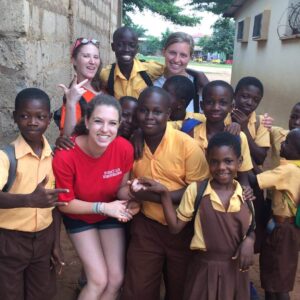
By Sabrina Guilbeault ’18
Assistant News Editor
Creating sustainable, collaborative, and innovative aid that fosters empowerment, education, and self-sufficiency is the mission of the Global Sustainable Aid Project (GSAP), and since 2010, Providence College students have been given the opportunity to see this mission play out in action in Ghana.
Led by Dr. Stephen Mecca, the Maymester class in Ghana offers students three academic credits and fulfills the civic engagement proficiency at the college.
“This Maymester course is a unique opportunity to have three professors teaching students to analyze the social value of complex problem solving in the devloping world from a systems, ethical, and business approach,” said Dr. Terence Goldrick, a professor of theology who will teach the class for the first time. He explained he is excited to have the support of the PCSB for ethics. “The course is an example of our shared conviction that business is a force for the common good in partnership with the liberal arts and sceinces,” he said.
“I had the opportunity to talk to Dr. Mecca at the Study Abroad Fair in the fall of last year, and I was immediately drawn in by the sustainability focus and with the initiatives that we would work on while we were in Ghana,” said Gabriella Dess ’18, who participated last year. “I appreciated the fact that Dr. Mecca has had a very thoughtful and involved relationship with the group of Ghanaians and that he knows their lifestyle and knows how we can most effectively work with them to help them achieve their goals.”
Claire Kleinschmidt ’17, a physics and engineering student, has worked with Dr. Mecca for seven semesters and explained how being involved in an interdisciplinary lab dedicated to finding sustainable solutions for the developing world has shaped her college experience.
“This Maymester gave me the opportunity to intern in Ghana at GSAP and implement the research I’ve been working on and see how it is being used to empower entire communities,” she said.
The program, which also includes pre-departure briefings, advanced readings, and post travel reflections, involves two weeks in Ghana where students will work on projects through GSAP.
This year’s program will focus on improving literacy rates in schools and implementing inexpensive and effective interventions to improve water, sanitation, and hygiene.
One project, the GSAP Microflush Toilet, was created by Dr. Mecca, and is an “off-grid, sustainable, environmentally friendly, low cost, odor- and fly-free toilet that reuses one cup of greywater from a previous user’s hand wash to isolate waste and flush the toilet.”
Microflush toilets are often built near two to three households, so that multiple households can share a toilet, bringing the cost down further.
“I spent a few days in the field working with others on building the Microflush toilet,” said Nicole Mills ’17. “As a business major, I teamed up with one of the students from Ashesi University in Ghana to work with and learn about the lender model which allows those we train on how to build toilets to develop their own business and a sustainable income.”
She mentioned that students should not let their major stop them from applying, because there is a place in the program for everyone.
Dess explained that she and other students went into schools and identified what areas needed improvement, including handwashing and literacy. “We worked to improve their school libraries, and implement a more effective and useful system,” she said.
She gave an example of how in one library termites had eaten shelving, and once the shelves were all taken down and replaced, students worked together to organize books into different categories, and the students in Ghana were encouraged to continue reading and learning while at home.
“Meeting peers from Ghana and working together on these projects is going to be the kind of transforming experience study abroad is meant to be, instead of academic tourism,” said Dr. McGoldrick.
Reflecting on her experience, Mills said, “When I came home, everyone asked me if I had fun, and I never wanted to say it was fun, because it wasn’t. We were living in rural conditions, in extreme heat, doing hard work, and some of us got sick.”
Still, she noted just how beneficial the trip was. “Whether it was talking to one of the students from the University of Ghana and learning about their culture, touring the country, or even putting a toilet together, the trip helped me in some way.”
Applications for the program this May are available online. The application is due on Feb. 14, or until positions are filled, and final notices of acceptance will be made in late February.
“Something I am very glad I discovered there was the importance of empowering others to mobilize themselves and that this type of community organizing takes a lot of work,” said Dess. “I would have liked to have done more while I was there, but it is a difficult and intensive process to achieve long term results.”
She explained that the program is applicable to students who are interested in global health and students wishing to see first-hand how implementing sustainable projects can yield long term and positive results.
“I was incredibly moved by the faith so many Ghanaians held dear and the vibrancy of their culture,” said Kleinschmidt. She explained how the program will push students to think beyond their Western worldview and learn to embrace life in a rural, developing village.
Reflecting on her experience, Kleinschmidt stated, “This program has helped me be so much more grateful and intentional about who I am and what I choose to spend my time doing. Go.”
The Eaton Street Café Gives Students Fun Options
by The Cowl Editor on January 27, 2017
News
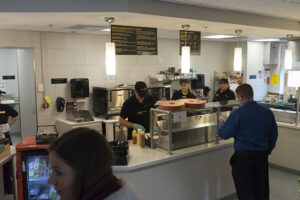
by Sabrina Guilbeault ’18
Assistant News Editor
The Arthur F. and Patricia Ryan Center for Business Studies is not the only new entity on campus this semester at Providence College. The opening of the new business building also came with the Eaton Street Café: PC’s newest dining facility.
The Eaton Street Café offers students a multitude of options. From Sandella’s to a deli, from goods previously offered at the Friar Buyer to a late night takeout window, the purpose of the Eaton Street Café is to give students a variety of fun options. “When discussion first started about adding a café or restaurant to the business school, we asked, ‘what can we do to make this fun?’” said Sodexo General Manager Stu Gerhardt. He explained much of the initial conversations were held between himself, Warren Gray, and John McSweeney.
Gerhardt explained that the café needed to provide options that catered to both students and faculty, especially since the café is found so close to faculty offices inside the school compared to Sandella’s being located in the basement of Davis Hall. “Faculty members don’t want the same menu as the students,” said Gerhardt. “What we knew is that we needed a menu that would attract both the business school audience and the kids.”
Inside the Eaton Street Café, students can still find Sandella’s where paninis, quesadillas, burritos, and flat bread sandwiches are offered. “Sandella’s is a good brand,” said Gerhardt. “It’s good, wholesome, and people know it.”
The café also will house a deli, which will offer meats from local farms in New England, such as roast beef, ham, and turkey. A self-service Starbucks espresso machine is also available for use, which can make coffee options such as cappuccinos, Americanos, and espressos. The Eaton Street Café also introduced a Grill menu that offers breakfast, lunch and dinner, and late night options. The Grill offers basic food options such as burgers, steak and cheese sandwiches, and grilled chicken sandwiches.
Gerhardt stated that he is very excited about the name of the Eaton Street Café and said he hopes that it attracts the students living in the apartment dorms and students living on Eaton Street. “The big question became, what about the kids that live on Eaton?” he said.
The café will stay open as late as the business school; however, once the building closes, the late night menu will operate from the takeout window until 2 a.m. “We wanted the takeout window to feel like a food truck,” said Gerhardt. “The big difference between the takeout window and a food truck is that you can use your Friarbucks.”
The Late Night menu offers a variety of food options including curly fries, chicken tenders, and tater tots that will not be offered anywhere else on campus. The café offers breakfast sandwiches and breakfast food, which will be open as early as 8 a.m. “We’re excited about the Scrambler, which is basically a sandwich with scrambled eggs, tater tots, bacon, and cheese,” said Gerhardt.
“We want to continue with the fun and make it different,” said Gerhardt. “Just wait until the patio is done and the weather gets warm. There will be tons of tables that will be out there.” Opened for just over a week, Gerhardt explained that business inside the Café has already been great. “Right now we’re selling out of everything,” he said. “We keep making new orders every day.”
The space that held Sandella’s and the Friar Buyer in Davis is currently unoccupied, and last night at Student Congress, Dean of Students Steven Sears stated that students with any ideas as to what to do with the space are welcomed to contact him.
Gerhardt explained that the success of any new operation depends on its willingness to be progressive. “The college keeps growing, and sometimes that makes it harder, but in other aspects it makes it more fun,” he said. “The Eaton Street Café is a comfortable, warm, inviting space, and will allow the dining services offered by PC to stay up with the trends.”
